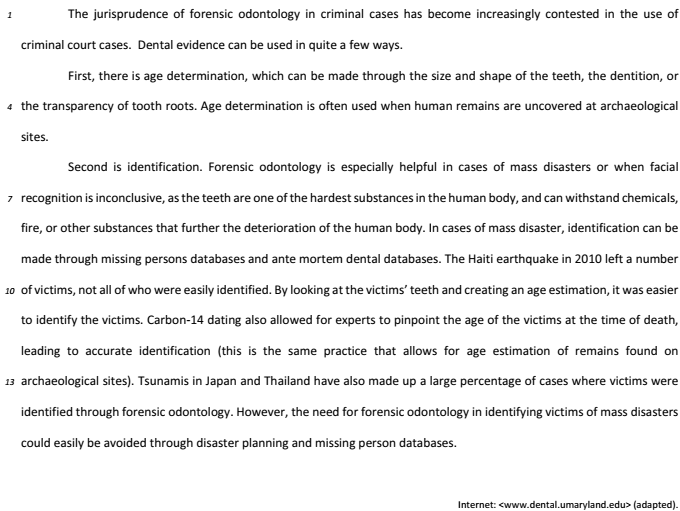Questões de Concurso
Sobre inglês
Foram encontradas 17.407 questões
Resolva questões gratuitamente!
Junte-se a mais de 4 milhões de concurseiros!

Further and farther are both comparative forms for the adjective far; therefore, “further” (line 20) can be correctly replaced by farther, without a change in meaning.

The word “addressed” (line 11) shows the exact location of the equipment necessary to record the signals for the specific electrophysiology testing.

The word “Occasionally” (line 17) is an adverbial adjunction which means that an action frequently happens within a short period of time.

The terms “measuring” (line 6) and “understanding” (line 9) are both in the present participle form, for the reason that both are preceded by a preposition.

The pronoun “their” (line 4) refers to “the molecular and cellular processes” (line 3).

The relative pronoun “that” (line 2) could be correctly replaced by which, without a change in meaning.

Electrophysiology is a science used to scrutinize our brains in order to examine how information is processed by the electrical activity developed inside of it.

The sentence “regardless of education levels” (line 4) can be correctly rewritten as despite of education levels, without a change in meaning.

The term “resilient”, as used in line 13, means to be able to withstand adverse or challenging circumstances.

According to the text, people who are bilingual have around 5% less chances of getting Alzheimer’s disease.

The term “who” (line 8) is a relative pronoun, as well as whom, which is the object form of who.

The term “can” (line 6), as a modal verb, changes the meaning of the whole sentence, not only the meaning of the main verb.

The expression “due to” (line 11) is used to introduce a cause to a situation previously mentioned.

The term “stall” (line 6) could be correctly replaced with stop, without this changing the meaning of the text.

The term “furthering” (line 2) is the Present Participle form of further and it is related to distance, since further is the comparative form of the adjective far.

In line 11, “has been” is an example of the Present Perfect tense, which is formed by the Present Simple form of the verb to have and the Present Perfect form of the main verb.

The text states that speaking one more language may lower the rates of dementia and memory problems in more advanced ages.

According to the text, people who learn a new language are free from developing mental diseases.
According to the text, judge the item.
The terms “especially” (line 6), “inconclusive” (line 7) and “substances” (line 7) are Portuguese false cognates.
According to the text, judge the item.
Without changing the meaning of the text, the term “which” (line 3) could be correctly replace by that, and the term
“that” (line 12) could be correctly replaced by which.
